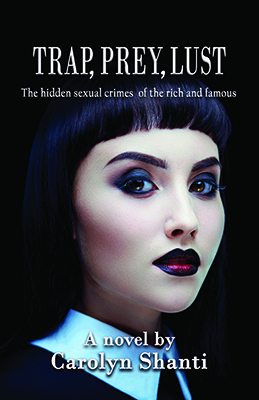Description
The novel ‘Trap, Prey, Lust’ is based on the true story of the author’s experience of childhood sexual and ritual abuse.
The most notorious of the Hexagon Clubs is in London: exclusive, expensive, catering to very rich men, who seek endless highs in their nightly sexual sports. The super-rich elite travel constantly, wealthy scavengers looking for the next fix, the next sexual partner and a better, more expensive orgasm. There is no end to their greed and sexual extravagance.
The clubs have spread everywhere. Their history lies in the eccentric sexual practices of the English Gothic era, the sexual crimes of Nazi Germany and the ‘Book of the Dead’ from Ancient Egypt.
The senior members of the club are famous men, whose wealth and position have protected them from exposure or punishment for their sexual misdemeanours. Their daughters are raped, sexually abused and groomed from a young age, to be presented to the club as young whores for the new generation of members to enjoy. The protection of wealth and privilege that club members enjoy is absolute, until finally, their crimes are exposed.
Carolyn Shanti is the author of ‘Trap, Prey, Lust’. The novel is based on the true story of her own childhood, where she was brought up in a wealthy and privileged family in England. A secluded and idyllic mansion, surrounded by acres of private property, was where she spent her childhood years. It was also a place of dark shadows and sexual secrets. Her father, a prominent businessman in the fashion industry, was a member of a well-known occult society. As a young child, Carolyn suffered ritual sexual abuse and was raped, not only by her own father but by members of the society. She was ‘groomed’, and the use of mind control techniques were put in place to work against her remembering the abuse or the perpetrators of these acts of violence. It was on a trip to India in 2013 that she started to have memories of the abuse. She was so unwell that she sought the help of Dr Rajan Sankaran, a renowned holistic physician, homeopath and international speaker. In gratitude for his help, she has dedicated her book to him. For four years, she was under his care at his clinic in Mumbai and has now almost completed her healing. It has been a long and arduous journey.
In ‘Trap, Prey, Lust’, she has narrated her own story of childhood abuse in the form of fiction. Her wish in publishing this book is to demonstrate the seriousness of the issues that we face in the sexual abuse of women and children, the cults and secret societies that support these crimes, and the cultures that often condone these practices.
“Of course, the intrigue starts with the title. Each word is more than a verb it is or could be, a ‘command word.’ These triumvirate of command words are intended to be discomforting. But the title can be read in other ways too. The words give more than a clue to the nature of the contents with a decidedly sinister and yet purposefully salacious intent. Carolyn Shanti’s words are throughout, tightly woven, even dense in detail and description is clearly something this author enjoys. And like all good story-telling, the text has pace and drive. The level of sensuality of much of the book, of awakening and desire is sensitively yet graphically handled which again keeps the pace keen. The deliberate, misplaced sexual intent represents the ‘hunger of the moment’. Shanti makes it a knowingly, but compulsive read.
Certainly, there is a filmic quality to the novel – not as a big screen construct – but more assuredly a compelling 3-part series, say – much like the old publication device, the 3-decker novel intended to increase interest. All the characters mentioned are well-sculpted, well-drawn with the eye of a keen observer and there is the feeling that both author and reader are actually within the text as perhaps silent and invisible ‘other players.’ The author has made a most uncomfortable yet magnetic stage linking present and past for this selection of totally believable jigsaw-misfits.”
Robin Dutt, Author of ‘Gilbert & George, Obsessions & Compulsions,’ Cats’ by Martin Leman (Foreword by Sir Roy Strong) and President of the Book Club and Creative Writing Society, Home House, London.




